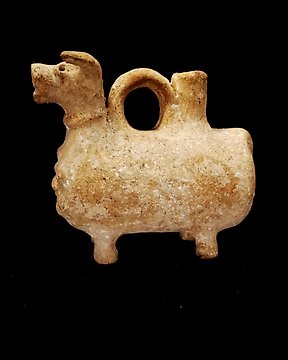
Fenicisk - Zoomorphic Rhyton - tjur - 3:e / 2:a årtusendet f.Kr
Nr 84100743

Nr 84100743

Due to custom regulations we can not ship outside the E.U. Please make sure you have an EU shipping address before bidding.
Necklace, ring and earrings with authentic Egyptian turquoise (semi-precious stone) and carnelian beads.
Necklace:
Length: ± 47 cm
Diameter beads: ± 7,3 mm maximum
Earrings:
Total length: ± 48,9 mm
Diameter beads: ± 4,1 mm maximum
Ring, the beads are wire-wrapped on a new gold-plated ring.
Outside diameter: ± 25,1 mm
Inside diameter: ± 21,8 - 17 mm
Diameter beads: ± 6,2 mm maximum
Good condition and wearable. The ancient beads are restrung with modern gold-plated spacer beads and fittings. Signs of wear consistent with age and use. See images.
Certificate of Authenticity available upon request (pdf-document).
Ancient beads:
All authentic ancient beads are slightly different in shape or colour shade and show different signs of wear. This adds to the charm of each piece and makes every composition unique.
HISTORY:
The Egyptians believed carnelian had magical powers; it was believed it could ward off evil, help the blood circulation and make the skin look healthy and youthful.
Carnelian was known as the 'Blood of Isis' (Goddess of nature and guide of souls to the Underworld). Accordingly, a carnelian amulet called a 'thet' was placed on mummies to assist the dead in their journey to the afterlife.
The Egyptian faith in carnelian was so strong that, along with turquoise and lapis lazuli, it was the most used stone in ancient Egyptian jewellery.
Turquoise was a prized possession for ancient Egyptians and their Pharaohs. The iconic burial mask of Tutankhamun was extravagantly adorned with this gemstone.
Its light blue-green colour was greatly valued by the ancient Egyptians who associated it with fertility and vegetation. The ancient Egyptians believed it protected all those who wore it.
At the end of the 5th Millennium BC the Egyptians started making faience. This allowed them to imitate the highly prized and rare semi-precious turquoise gemstones and produce it in higher quantities.
Hur du köper på Catawiki
1. Upptäck något speciellt
2. Lägg det högsta budet
3. Gör en säker betalning